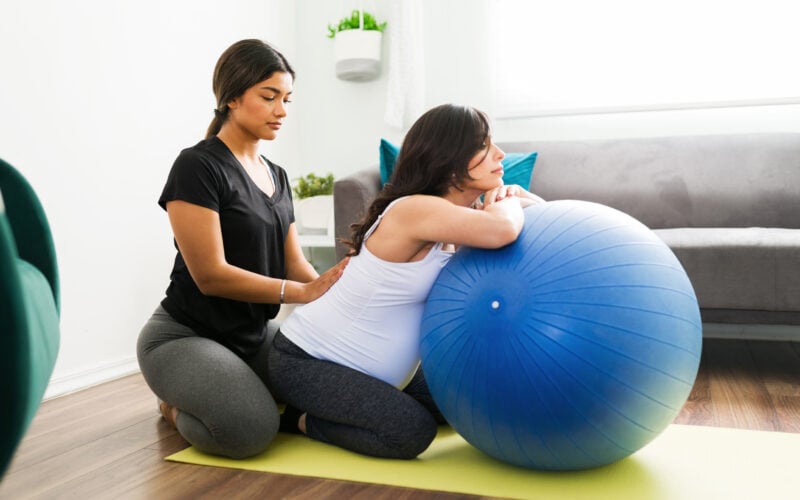When Aysha, a mom from the greater Los Angeles area, gave birth to her third child last year, she received doula support as part of a wraparound program by Victoria Project, a nonprofit that includes “birth center midwifery care, doula care, acupuncture, home birth, and chiropractic care, lactation support, and doula care for pregnancy loss and miscarriage” for qualified applicants. Tragically, black women like Aysha are three times more likely to die of pregnancy-related causes than white women, according to the Centers for Disease Control and Prevention (CDC). But Victoria Project’s several hundred clients in their first year of operation didn’t just defy the abysmal statistics of birth for black women; these women had healthy, positive labor and birth experiences. While Victoria Project includes much more than doula services, there is evidence to suggest that simply having doula support during labor can go a long way toward improving maternal and infant outcomes for all mothers and babies.
If you are pregnant or researching options for giving birth, chances are you’ve come across the term “doula.” Maybe you’ve heard a relative mention that a doula supported her through a non-medicated birth. Or perhaps a friend who underwent a Cesarean section shared that, while the delivery deviated from her birth plan, a doula helped her remain calm after interventions were deemed medically necessary.
In this article, we’ll explore the doula’s role, the distinction between birth doulas and the medical professionals involved in childbirth, and the latest research on the benefits of doula-assisted labors and births. While we’ll be focusing on birth doulas here, some doulas are also trained as postpartum doulas, providing assistance in the weeks and months after the birth.
What is a birth doula?
According to medical sociologist Dr. Christine Morton, a birth doula is a companion who supports a pregnant woman during labor and birth. Birth Ambassadors, Morton’s book on the re-emergence of woman-supported birth in America, explores how the modern-day doula’s role evolved from the ancient cultural practice of women-attended childbirth. In fact, the word “doula” itself derives from an ancient Greek word meaning “a woman who serves.”
Today, the doula’s main role is to provide continuous, one-on-one care to women in labor and their partners, as well as providing physical and emotional support.
Are doulas medically trained?
You might be wondering why a doula’s assistance is useful, given that most women who give birth are attended by nurses, doctors, and/or midwives. Here, it’s important to understand the distinctions between the care offered by each professional.
Doulas are not medical professionals. The support offered by doulas complements the medical care provided by an OB/GYN or midwife. Genevieve Howland, author of the popular blog Mama Natural and the Mama Natural Week-by-Week Guide to Pregnancy, explains that while many doulas do not have formal medical training, each one understands and is “trained in the physiological process of childbirth.” A doula provides “emotional, physical, and informational support,” meaning that “she is available to focus on mothering the mother instead of clinical tasks.”
What does a doula do?
So, how exactly does a doula support a woman and her partner during childbirth?
Often, the doula’s support begins months before the birth. During pregnancy, doulas can help you create a birth plan, in which you outline your preferences during labor and delivery. Do you plan to receive pain medication or an epidural? Would you like to labor in silence or with soft music playing in the background? Of course, these are preferences rather than guarantees, and things may change due to your own wishes or what is deemed medically necessary. However, naming your goals in advance will help you make informed choices when faced with the intense physical and emotional pressures of birthing.
When labor begins, most doulas will come to your home to assist you during its early stages. Doulas can guide you through breathing and relaxation techniques as well as laboring positions, offer massages for comfort, and ensure that you eat enough and remain properly hydrated. If you plan to give birth at a hospital or birthing center, they’ll also help you decide when it’s time to go.
At the hospital, your doula will remain with you throughout labor and delivery, and most doulas will stay for a couple of hours after the birth to help you establish breastfeeding.
In an article for Evidence Based Birth, Rebecca Dekker, PhD, RN writes about the four pillars of doula support: physical, emotional, and informational support, and advocacy.
Physical support
Physically, the doula might offer (or coach your partner on offering) soothing touch using massage or counter pressure. She will also help create a calm environment and can help assist with water therapy in a shower or tub.
Emotional encouragement
Emotionally, she will calm anxieties by helping you and your partner process fear and self-doubt. She might use the “mirroring” technique, in which she calmly describes what you are experiencing and echoes back the same feelings and intensity. Howland writes that if medical interventions that depart from the birth plan become necessary, a doula can also “help support the mother emotionally so she can have a positive birth experience despite changes in her birth plan.” In addition, doulas can help delivery feel more natural despite the unplanned interventions.
Information and education
From an informational standpoint, a doula will help you and your partner understand what is happening throughout labor, and will offer evidence-based information about birth options. Additionally, she can suggest labor techniques including breathing, movement, and positioning.
Advocacy
Your doula is trained to help you verbalize your preferences and will help amplify your voice if you are being dismissed or ignored.
How does a doula’s support differ from a partner’s support?
You may be wondering how your doula’s role in the delivery room differs from that of your partner. Howland sums up the differences well when she writes that “your husband or partner knows you, and the doula knows birth.” Most partners are just as unfamiliar with the birthing process as the laboring mother, while doulas have received specific training and are experienced in coaching women through its various stages. A 2008 study also found that women who were assisted by both a supportive partner and a doula had a significantly lowered risk of a Cesarean section compared to those supported by a partner alone. [1]
What makes doulas and partners such a great team? Some women find that hiring a doula takes pressure off their partners, who do not have to step into the unfamiliar role of primary birth coach. Others mention that their doula provided wonderful support for the partners themselves by helping them understand the stages of labor, interpret the sounds being made by the laboring woman, or offer counter pressure to help manage pain. Finally, some women noted that the doula became an advocate for the couple in helping them communicate effectively with their medical team.
What doulas don’t do
Again, doulas are not trained medical professionals. As such, they are not responsible for clinical tasks that may be necessary during labor and birth, such as fetal heart monitoring or vaginal exams. Doulas do not offer medical advice, nor do they diagnose conditions.
The doula training and certification organization DONA International also states that, while doulas may advocate for women with the medical team, they should never speak for them. In addition, doulas do not pressure the woman into making decisions.
What are the benefits of doula-assisted births?
A Lamaze Healthy Birth Practice paper published in Perinatal Education in 2007 argues that continuous labor support helps alleviate fear and anxiety, leading to overall healthier and more efficient labor progress.
This claim is backed up by research. In 2014, the American College of Obstetricians and Gynecologists (ACOG) issued a consensus statement on Safe Prevention of the Primary Cesarean Delivery. According to the statement, “published data indicate[s] that one of the most effective tools to improve labor and delivery outcomes is the continuous presence of support personnel, such as a doula.” [2]
More recently, in 2017, a team of researchers published a systematic review on the use of continuous support during childbirth. [3] The review, which included the results of 26 trials involving 15,858 women in 17 different countries, found that those who received continuous, one-on-one support rather than “usual” hospital care (where the laboring woman may be left alone with her partner for long stretches of time, while the labor and delivery staff attend to other births) were statistically more likely to have a spontaneous, vaginal birth rather than a Cesarean section or a delivery requiring the use of vacuum extraction or forceps. Those receiving support were also less likely to need pain medication and epidurals, their labors were shorter by around 40 minutes, and they were less likely to report negative feelings about their childbirth experience. Babies born to those receiving continuous support were also less likely to have low Apgar scores (a test that checks the baby’s heart rate, muscle tone, and signs of distress) soon after birth.
How many people use doula services?
More women are turning to doulas to assist them during birth than ever before (during modern times, anyway!). DONA International reports significant growth over the last decade, now boasting more than 5,000 members in over 56 countries. In a major 2012 survey involving 2,400 laboring women in the US, 6% said they used a doula during childbirth, up from 3% in 2006. [4] Much remains to be done in order to make doula services more accessible and affordable, however, as 27% of people who did not have a doula but understood what they were would have liked to have one.
Though more scientific research into recent trends is needed, circumstantial evidence suggests that the demand for doulas is increasing in the US and elsewhere. A 2021 article in Harper’s BAZAAR UK, for example, reported that a specialized UK search engine called The Doula Directory has seen “a massive increase in enquiries of more than 50 percent over the past year.”
How much do doula services cost?
For those who would have liked to hire a doula but chose not to, cost remains the biggest prohibiting factor. Depending on your area of the country, doulas might charge anywhere from $300 to $1000 for their services, or up to $2500 in cities like New York. Many doulas, however, are willing to set up a payment plan or sliding scale for those in need.
Depending on where you live and your income level, you may qualify for low-cost or no-cost doula care offered through a nonprofit like Victoria Project or your health department. Recently, some major cities in the United States have begun developing initiatives to provide free doula care to some pregnant mothers, in an effort to combat the increased risk in maternal and infant mortality faced by women of color. In New York City, for example, where black residents have a nine-fold increased risk for pregnancy-related death compared to white residents, mayor Eric Adams is hopeful that the NYC’s new Citywide Doula Initiative may help combat inequality in birth outcomes.
If you have health insurance, you may also be able to allocate funds from your health savings account to cover doula costs. Additionally, some insurance companies will cover a portion or all of the cost, since evidence suggesting that doulas can help reduce the risk for a C-section is leading more companies to classify doulas as preventative care.
How do I find a doula?
If you’re considering hiring a doula, Childbirth Connection offers a wonderful list of interview questions for a doula.
When searching for a doula who is a good fit for your needs, many women rely on recommendations from local friends and family. You may also wish to consult DoulaMatch.net or DONA International’s Certified Doula Directory. National Black Doulas Association (NBDA) also connects black families with certified black doulas skilled in providing culturally competent care.
No matter what kind of birth you hope to have, evidence suggests that a doula can help you have a better birthing experience.
References
[1] McGrath SK, Kennell JH. A randomized controlled trial of continuous labor support for middle-class couples: effect on cesarean delivery rates. Birth. 2008 Jun;35(2):92-7. doi: 10.1111/j.1523-536X.2008.00221.x. PMID: 18507579. [2] American College of Obstetricians and Gynecologists (College); Society for Maternal-Fetal Medicine, Caughey AB, Cahill AG, Guise JM, Rouse DJ. Safe prevention of the primary cesarean delivery. Am J Obstet Gynecol. 2014 Mar;210(3):179-93. doi: 10.1016/j.ajog.2014.01.026. PMID: 24565430. [3] Bohren, Meghan et. al. (2017). “Continuous support for women during childbirth.” The Cochrane database of systematic reviews. doi: 10.1002/14651858.CD003766.pub6. [4] Declercq, Eugene R et al. “Major Survey Findings of Listening to Mothers(SM) III: Pregnancy and Birth: Report of the Third National U.S. Survey of Women’s Childbearing Experiences.” The Journal of perinatal education vol. 23,1 (2014): 9-16. doi:10.1891/1058-1243.23.1.9Additional Reading:
The 6 things every woman considering a natural childbirth needs to know
Beyond the epidural: labor pain management options
So you’re going to give birth in the United States: what are your options?
Traumatic birth experiences are more common than you might think: a mental health perspective
Addressing our maternal mortality crisis with fertility awareness







